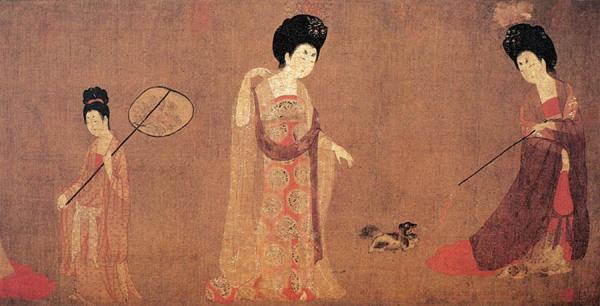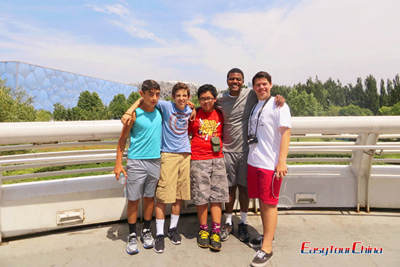Tang Dynasty
The Tang Dynasty (618-907) is the most glistening historic period in Chinese history. During this glorious period, the politics, economy, culture and military strength reached an unprecedented advanced level. Its capital, Chang'an (present-day Xi'an), the most populous city in the world at that time, became a cultural and international trade center.
Tang is a period that spread its culture and absorbed the cultures of surrounding states - a golden age of cosmopolitan culture. Buddhism, which had gradually been established in China from the first century, became the predominant religion and was adopted by the imperial family and many of the commoners.

At that time, Chang'an, along with Luoyang and Guangzhou, and other trading centers, were all home to foreign communities. They brought with them new religions, food, music and traditions. A great part of Tang aristocracy even was of Non-Chinese origin, and merchants from Inner Asia dwelled Chang'an. Cultural relations were established with many countries include Japan, Korea, India, Persia and Arabia.
This period produced perhaps China's two most famous poets - Du Fu and Li Bai. There was another famous woman in Tang Dynasty - Wu Zetian. She was the only female emperor in Chinese history.
Tang Dynasty Facts
Tang Dynasty Emperors & Timeline with Years
There were 21 emperors ruled the Tang Dynasty, including those who were deposed. The first emperor of the Tang Dynasty was Li Yuan, Emperor Gaozu of Tang. The last emperor of the Tang Dynasty was Li Zhu, Emperor Jingzong of Tang, better known as Emperor Ai of Tang. The most important emperors of the Tang Dynasty are Emperor Gaozu, Emperor Taizong, and Emperor Xuanzong. Here is China’s Tang Dynasty emperors list in chronological order.
| Sovereign | Personal Name | Posthumous Name | Reign Years | Mausoleum | Remarks |
|---|---|---|---|---|---|
| Emperor Gaozu of Tang (唐高祖) | Li Yuan (李渊) | Emperor Shenyao (神堯皇帝)) | 618-626 | Xianling Mausoleum (献陵) | The founder and first emperor of the Tang Dynasty |
| Emperor Taizong of Tang (唐太宗) | Li Shimin (李世民) | Emperor Wenwu (文武皇帝) | 626-649 | Zhaoling Mausoleum (昭陵) | One of the greatest emperors in Chinese history |
| Emperor Gaozong of Tang (唐高宗) | Li Zhi (李治) | Emperor Tianhuang (天皇大帝) | 649-683 | Qianling Mausoleum (乾陵) | Assisted by Empress Wu for over half of his reign. |
| Emperor Zhongzong of Tang (唐中宗) | Li Xian (李显) | N/A | 684 | Dingling Mausoleum (定陵) | Deposed by Empress Wu |
| Emperor Ruizong of Tang (唐睿宗) | Li Dan (李旦) | N/A | 684 | Qialling Mausoleum (桥陵) | A puppet ruler controlled by Empress Wu |
Wu Zhou Dynasty (690-705): an interregnum of the Tang Dynasty | |||||
| Emperor Zhongzong of Tang (唐中宗) | Li Xian (李显) | Emperor Xiaohe (孝和皇帝) | 705-710 | Dingling Mausoleum (定陵) | He became emperor again after Empress Wu was deposed. |
| N/A | Li Chongmao (李重茂) | Emperor Shang (殇皇帝) | 710 | Unknown | The shortest reign in the Tang Dynasty (only 17 days) |
| Emperor Ruizong of Tang (唐睿宗) | Li Dan (李旦) | Emperor Xiaowen (孝文皇帝) | 710-712 | Qialling Mausoleum (桥陵) | |
| Emperor Xuanzongof Tang (唐玄宗) | Li Longji (李隆基) | Emperor Zhidao (至道皇帝) | 712-756 | Tailing Mausoleum (泰陵) | The Tang Dynasty reached its peak during his reign. |
| Emperor Suzong of Tang (唐肃宗) | Li Heng (李亨) | Emperor Wenming (文明皇帝) | 756-762 | Jianling Mausoleum (建陵) | The An Lushan Rebellion was suppressed. |
| Emperor Daizong of Tang (唐代宗) | Li Yu (李豫) | Emperor Ruiwen (睿文皇帝) | 762-779 | Yuanling Mausoleum (元陵) | The beginning of Fanzhen Geju (splittism of military settlements along the empire’s border areas) |
| Emperor Dezong of Tang (唐德宗) | Li Kuo (李适) | Emperor Shenwu (神武皇帝) | 779-805 | Chongling Mausoleum (崇陵) | Allied with Nanzhao and Huihe to defeat Tufan |
| Emperor Shunzong of Tang (唐顺宗) | Li Song (李诵) | Emperor Zhide (至德皇帝) | 805 | Fengling Mausoleum (丰陵) | |
| Emperor Xianzong of Tang (唐宪宗) | Li Chun (李纯) | Emperor Zhaowen (昭文皇帝) | 805-820 | Jingling Mausoleum (景陵) | The economy recovered gradually. Everything was flourishing again. |
| Emperor Muzong of Tang (唐穆宗) | Li Heng (李恒) | Emperor Ruisheng (睿圣皇帝) | 820-824 | Guangling Mausoleum (光陵) | He indulged himself in pleasure rather than performing his duties as emperor. |
| Emperor Jingzong of Tang (唐敬宗) | Li Zhan (李湛) | Emperor Ruiwu (睿武皇帝) | 824-827 | Zhuangling Mausoleum (庄陵) | He also indulged himself in pleasure. Eunuchs held onto real power. |
| Emperor Wenzong of Tang (唐文宗) | Li Ang (李昂) | Emperor Yuansheng (元圣皇帝) | 827-840 | Zhangling Mausoleum (章陵) | He tried to suppress the eunuch group but failed. |
| Emperor Wuzong of Tang (唐武宗) | Li Yan (李炎) | Emperor Zhidao (至道皇帝) | 840-846 | Duanling Mausoleum (端陵) | He suppressed the powerful eunuchs and rebellious warlords. To develop the economy, he restricted Buddhism. |
| Emperor Xuanzong of Tang (唐宣宗) | Li Chen (李忱) | Emperor Yuansheng (元圣皇帝) | 846-859 | Zhenling Mausoleum (贞陵) | A diligent, discerning, and humble monarch |
| Emperor Yizong of Tang (唐懿宗) | Li Cui (李漼) | Emperor Zhaosheng (昭圣皇帝) | 859-873 | Jianling Mausoleum (简陵) | The Tang Dynasty went into decline. |
| Emperor Xizong of Tang (唐僖宗) | Li Xuan (李儇) | Emperor Huisheng (惠圣皇帝) | 873-888 | Jingling Mausoleum (靖陵) | A fatuous and self-indulgent ruler |
| Emperor Zhaozong of Tang (唐昭宗) | Liu Zuan (李晔) | Emperor Shengmu (圣穆皇帝) | 888-904 | Heling Mausoleum (和陵) | He tried to rejuvenate the empire but failed. |
| Emperor Jingzong of Tang (唐景宗) | Li Zhu (李柷) | Emperor Ai (哀皇帝) | 904-907 | Wenling Mausoleum (温陵) | The last emperor of the Tang Dynasty |


